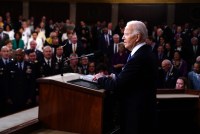Latest Morning Briefing Stories
Montana, an Island of Abortion Access, Preps for Consequential Elections and Court Decisions
A 25-year-old state Supreme Court ruling protects abortion rights in conservative Montana. That hasn’t stopped Republicans and anti-abortion advocates from trying to institute a ban.
Exclusive: Social Security Chief Vows to Fix ‘Cruel-Hearted’ Overpayment Clawbacks
New Social Security Commissioner Martin O’Malley is promising to change how the agency reclaims billions of dollars it wrongly pays to beneficiaries, saying the existing process is “cruel-hearted and mindless.”
West Virginia City Once Battered by Opioid Overdoses Confronts ‘Fourth Wave’
Years of struggle prepared residents in Cabell County, West Virginia, to confront the latest wave of the opioid epidemic as mixtures of fentanyl and other drugs claim lives nationwide.
Concerns Grow Over Quality of Care as Investor Groups Buy Not-for-Profit Nursing Homes
For-profit groups own more than 70% of U.S. nursing homes. Industry leaders and researchers wonder whether corporations and investors can succeed where not-for-profit organizations have struggled. Or, will quality of care suffer in the name of making money?
Secret Contract Aims to Upend Landmark California Prison Litigation
California has commissioned an exhaustive study of whether its prisons provide a constitutional level of mental health care, which it could use to try to end one of the lawsuits that have federal courts overseeing the state’s prisons. But corrections officials won’t disclose even basic details of the consultants’ contract, including its cost to taxpayers.
A New $16,000 Postpartum Depression Drug Is Here. How Will Insurers Handle It?
A pill form of an effective drug for postpartum depression hit the market in December, but most insurers do not yet have a policy on when or whether they will pay for it. The hurdles to obtain its predecessor medication have advocates worried.
California Voters Are Skeptical That More Money Is the Answer to Homelessness
California Gov. Gavin Newsom’s signature ballot measure to address mental illness, addiction, and homelessness with a $6.4 billion bond and other reforms, is barely ahead in the ongoing ballot count. The slim margin reflects a growing unease among Californians over the governor’s homelessness initiatives.
Why Covid Patients Who Could Most Benefit From Paxlovid Still Aren’t Getting It
Price worries, bureaucratic obstacles, and “I’m-over-covid-itis” slow uptake of a drug that’s complicated to take but often effective.
California Attorney General Boosts Bill Banning Medical Debt From Credit Reports
California Attorney General Rob Bonta has thrown his weight behind state Sen. Monique Limón’s legislation to bar unpaid medical bills from showing up on consumer credit reports. If passed, California would join just a few other states with such protections.
An Arm and a Leg: The Medicare Episode
On this episode of “An Arm and a Leg,” host Dan Weissmann breaks down the complicated and expensive world of Medicare with practical tips to pick the right plan and avoid penalties.
Biden Said State of the Union Is Strong and Made Clear His Campaign Is Off and Running
President Joe Biden used his roughly 68-minute address to Congress to counter lackluster public approval ratings and draw clear contrasts between his administration’s policies and those of Donald Trump and some congressional Republicans. Abortion and health care were in the spotlight.
VIP Health System for Top US Officials Risked Jeopardizing Care for Soldiers
The historically troubled White House Medical Unit is just one part of a government health system that gives VIP care to top officials, military officers, military retirees, and families. Pentagon investigators say some were prioritized over rank-and-file soldiers.
California May Face More Than $40M in Fines for Lapses in Prison Suicide Prevention
A court expert reported that California prisons continue to lag on 14 of 15 suicide prevention measures, and even regressed in some areas. The state could face more than $40 million in fines after a federal judge warned more than a year ago that she would impose penalties for each violation.
Biden Team, UnitedHealth Struggle to Restore Paralyzed Billing Systems After Cyberattack
The cyberattack on a unit of UnitedHealth Group’s Optum division is the worst on the health care industry in U.S. history, hospitals say. Providers struggling to get paid for care say the response by the insurer and the Biden administration has been inadequate.
What the Health? From KFF Health News: The State of the Union Is … Busy
At last, Congress is getting half of its annual spending bills across the finish line, albeit five months after the start of the fiscal year. Meanwhile, President Joe Biden delivers his annual State of the Union address, an over-the-counter birth control pill is (finally) available, and controversy erupts over new public health guidelines for covid-19 isolation. Alice Miranda Ollstein of Politico, Sarah Karlin-Smith of the Pink Sheet, and Sandhya Raman of CQ Roll Call join KFF Health News’ Julie Rovner to discuss these issues and more. Also this week, Rovner interviews Neera Tanden, the White House domestic policy adviser, about Biden’s health agenda. Plus, for “extra credit,” the panelists suggest health policy stories they read this week that they think you should read, too.
When It Comes to Ketamine, Meta’s Posting Policy Is No Party to Decipher
Despite growing awareness that the party drug is dangerous, the social media company is open to promotion of the drug in treating mental health.
Why Even Public Health Experts Have Limited Insight Into Stopping Gun Violence in America
After the 1996 Dickey Amendment halted federal spending on research into firearms risks, a small group of academics pressed on, with little money or political support, to document the nation’s growing gun violence problem and start to understand what can be done to curb the public health crisis.
Biden Is Right. The US Generally Pays Double That of Other Countries for Rx Drugs.
Research has consistently found that, overall, U.S. prescription drug prices are significantly higher, sometimes two to four times as high, compared with prices in other high-income industrialized countries. However, some market factors can obscure actual prices, making comparisons harder.
Statistical Models vs. Front-Line Workers: Who Knows Best How to Spend Opioid Settlement Cash?
A mathematical model designed to direct spending of opioid settlement funds is at the center of a debate over whether to invest in technology to guide long-term decisions or focus on the immediate needs of people in addiction.
Whistleblower Accuses Aledade, Largest US Independent Primary Care Network, of Medicare Fraud
A recently unsealed lawsuit alleges Aledade Inc. developed billing software that boosted revenues by making patients appear sicker than they were.


























